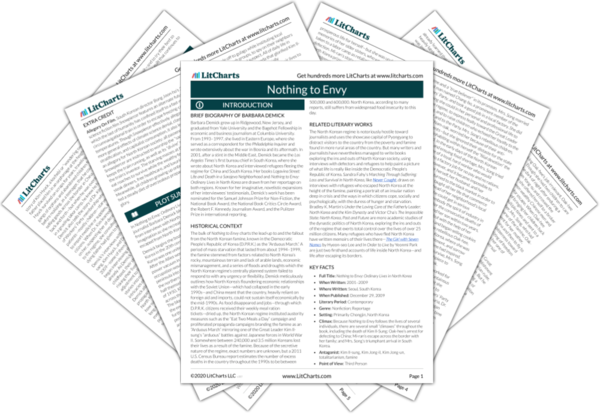Throughout Nothing to Envy, television symbolizes the ways in which North Korean citizens are given the illusion of choice and freedom within the crushing omnipresence of the Kim dynasty’s propaganda machine. By the 1990s, television was a permanent fixture in most households in the developed world. Television is a way of connecting with other perspectives, escaping into fantasy, and staying informed in a practical way. In North Korea, however, owning a television was—and still is—not just a luxury but a government-issued privilege. Author Barbara Demick reports that in the mid-1990s, North Korean citizens had to apply for permits to obtain a television—and once they were granted that permission, they found that their televisions broadcast only state programming on a constant loop. Televisions, then, provide certain North Korean households with the illusion of luxury and freedom while continuing to serve only the state’s interest by broadcasting incessant propaganda. The regime, she suggests, issue televisions to prominent members of certain communities so that their propaganda can reach entire villages of citizens who huddle around their more-privileged neighbors’ televisions to watch news broadcasts, documentaries, and other programming that serves to glorify the regime and perpetuate false information about the goings-on within North Korea and in the outside world. Throughout the book, Demick invokes the symbol of television to illustrate the dangerous, insidious character of North Korean propaganda.
Television Quotes in Nothing to Envy
North Korea invites parody. We laugh at the excesses of the propaganda and the gullibility of the people. But consider that their indoctrination began in infancy, during the fourteen-hour days spent in factory day-care centers; that for the subsequent fifty years' every song, film, newspaper article, and billboard was designed to deify Kim Il-sung; that the country was hermetically sealed to keep out anything that might cast doubt on Kim Il-sung's divinity Who could possibly resist?
The propaganda machine launched a new campaign, playing up Korean pride by recalling a largely apocryphal fable from 1938-39 in which Kim Il-sung commanded a small band of anti-Japanese guerrillas "fighting against thousands of enemies in 20 degrees below zero, braving through a heavy snowfall and starvation." […] The Arduous March, as they called it, would later become a metaphor for the famine. […] Enduring hunger became part of one's patriotic duty. Billboards went up in Pyongyang touting the new slogan, "Let's Ear Two Meals a Day." North Korean television ran a documentary about a man whose stomach burst, it was claimed, from eating too much rice.
Listening to South Korean television was like looking in the mirror for the first time in your life and realizing you were unattractive. North Koreans were always told theirs was the proudest country in the world, but the rest of the world considered it a pathetic, bankrupt regime. Jun-sang knew people were starving. He knew that people were dragged off to labor camps; but he had never before heard these figures. Surely South Korean news reports were exaggerated, just like North Korean propaganda?
He reminded himself: You don’t talk politics as long as you live in North Korea. Not with your best friend, not with your teachers or your parents, and certainly not with your girlfriend. Jun-sang never discussed his feelings about the regime with Mi-ran. He didn't tell her he was watching South Korean television, and reading pamphlets about capitalism. He certainly did not tell her that he had begun to harbor fantasies of defecting.












